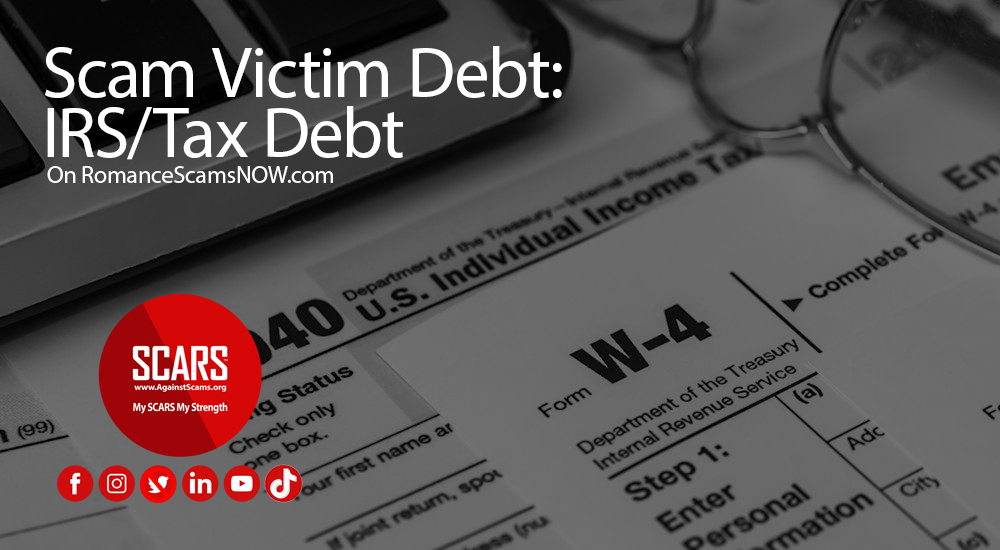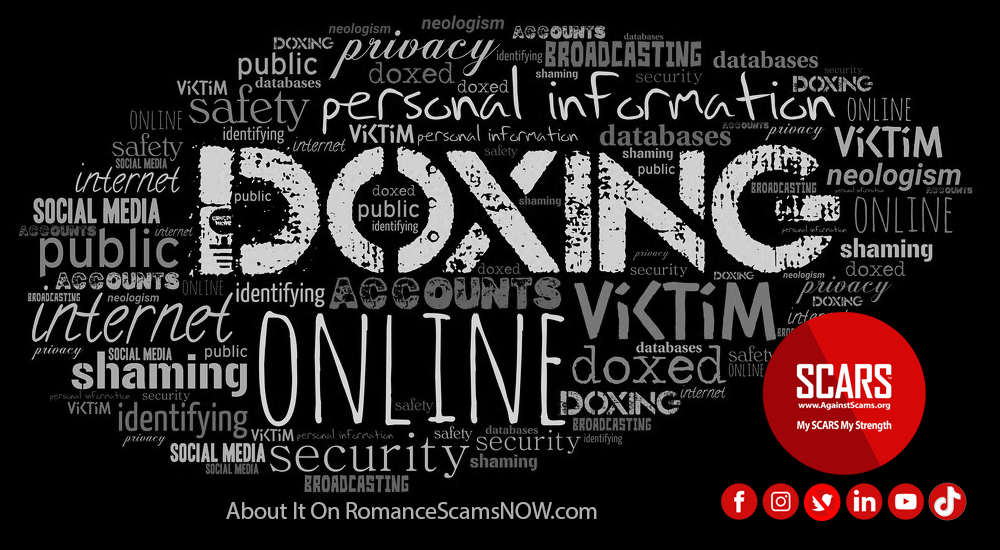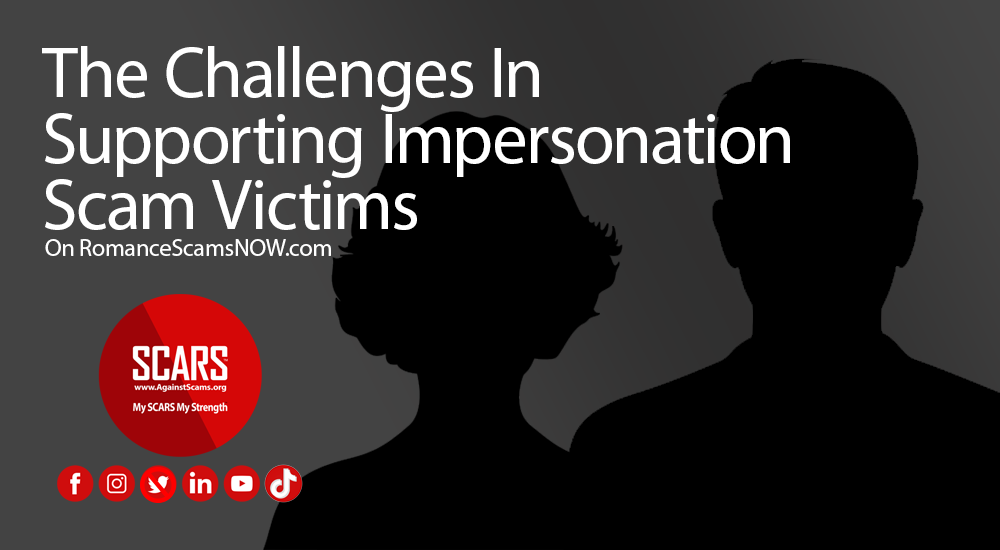
SCARS Institute’s Encyclopedia of Scams™ Published Continuously for 25 Years

The Challenges In Supporting Impersonation Scam Victims
Updated August 2022
The Responsibility To Help Victims Understand The Mechanics Of Scams
Many Times This Will Conflict With Their Beliefs
A SCARS Insight
Our Responsibility Is Sometimes To Deliver Hard Truths
A Discussion About Impersonation Scams And Accepting The Reality Of How They Work
One of the great challenges of helping scam victims is that while we do accept what they tell us, but it is not always based upon actual fact. We have an obligation to help them understand the reality of such situations.
What we mean specifically, is that when a scam victim identifies the scammer this is not always going to be as the victim believes. We mean that scammers do impersonate other real people constantly. In fact, there are billions of fake profiles in use on every imaginable platform.
We also have a duty to alert others. But to do so in a way that does not defame the person being impersonated even if this conflicts with what individual victims believe. We frequently post collections of stolen photos labeled that they are being used by scammers as a means of alerting anyone that sees them that there are scams where they are being used. We allow law enforcement to make the final determination about any specific individual’s innocence or not.
Unfortunately, not all victims can accept this. This can be too hard a truth to accept, and instead, they will turn on the assistance provider, even going so far as to enlist others in campaigns against those trying to help (such as SCARS). This happens more frequently than we would like, and in such cases, we turn the matter over to our attorneys and to our partners in law enforcement – since this is also a crime under United States Code Title 18 U.S. Code § 2261A
It is hard to tell people who firmly believe in the guilt of an individual that they should not blame the person that appears in the photo, that it is most probably an impersonation. It is much more satisfying for them to believe in that guilt, and just like with the scam itself – their cognitive biases make it very hard to accept anything else.
We are here to help them see the reality of scams and how they work, but we are not a mental health organization and are not able to address the psychological issues that might present themselves. This is often offensive to a small set of victims, and in those cases, we refer them to trauma counselors or therapists to help them work through those issues.
We are here to help those that can accept how scams function. We are here to help them understand that if law enforcement does not believe the person is the scammer, then they should let that go and focus on their own emotional recovery. We are not here to defame real people or participate in others’ actions to do this. We are not here to sustain mistaken beliefs when all indicators show that the person they want revenge against may be or is a victim themself. In those cases we try to help the victim see how impersonation scams work, and even how almost-perfect they appear. This is a hard thing to deliver to someone when they need to be listed to.
Unfortunately, we are in the business of delivering hard truths and there are many who will hate us for it. That is ok. We help those that we can.
More often than not, such victims will gravitate to hate groups or pull in other victims who are of like mind, and the result is obviously that they will not get the help they need. This will prevent their recovery and recapturing the lost selves the left behind, instead, they will remain fixated on their need for vengeance.
There is a very fine line between support and delivering truth that can allow a victim to free themselves from the scam and the past and look to the future, and supporting mistaken beliefs that keep a victim trapped into their post-scam belief system is on the other side of that line.
After the scam has been reported to law enforcement, and the police do not initiate an investigation of a known person or celebrity, the odds are quite great that it was an impersonation. And it is important to remember that we also have a responsibility to the impersonation victims too. When it comes to a conflict between the scam victim and the impersonation victims, we do what we can to help the scam victim understand that their belief may not be fact.
This is the seemingly impossible paradox of scam victim support. We automatically believe all victims, until the information directs itself into a nonfactual direction. Then we do our best to help the victim understand the reality of these horrible crimes. Unfortunately, about 60% of victims will be unable to accept this situation.
It is not that the scam did not happen, they do. It is not that they were not scammed by fake identities attached to a face, that also happened. But it is that final conclusion that if A equals B then B equals X – the leap that if a scam happened using the photo of a real person, it must be the real person that committed the scam. If we cannot make it clear to them that it was an impersonation scam, then we refer them to trauma counseling for additional support.
This is the process we follow. We understand the trauma of the experience and the process of scams and have created a support & recovery program for these victims. We understand that good people are scammed out of everything they have, but resolute belief is not always correct. We do our best to guide victims along the path of truth. They are free to disagree, and frequently their response is that we are the scammers. Something that does not support their grasp of the situation.
We are the largest such victims support organization, supporting victims worldwide. But the sad truth is that we cannot help everyone directly due to denial or aggression. We help those that are realistic enough that they can see how scams work and are able to actively participate in their own recovery. The rest we will have to help indirectly through our publications and media.
We do believe every victim’s story is their story, and we will work to help them understand the truth from mistaken beliefs so they can move forward. When we reach a point where our services are not appropriate we refer them to competent professional help. This is our model and conformant with our ethical standards.
Impersonation scams are very hard because of these issues. You see a face and you are sure it must be the real criminal but law enforcement refuses to take action. It is all just one big corrupt system. Then we come along and we try to tell you that it was not the person in the photo, and you cannot accept that. You just KNOW it is the person – they are the scammer – why won’t anyone listen to you? We must be scammers too.
Our’s is a re-entry process of helping victims recover from their experience and return to their former lives as best that they can. When we encounter defamation, anger and hate, and self-harming beliefs we do our best to correct these with as much fact and compassion as may be available, but at times it will fail. Anger and hate and the desire for vengeance have a 100% failure rate, we do not. There are plenty of groups that will feed their anger and hate and demands for vengeance – we will not. Victims should keep this in mind when looking for help.
If you are reading this now, please understand this is how our services work, and that we will do our best, but it will not always be perfect, and in some cases, it will not be enough. But if you can accept hard truths and commit to your recovery then you can make it.
If you cannot accept these arguments, then we wish you the best and suggest that you should talk with a professional trauma counselor to better address your needs. Here is a link to a directory of trauma counselors https://www.psychologytoday.com/us/therapists/trauma-and-ptsd
We hope that you can set your hate aside and get the help you need.
Just understand it may not agree with your perceptions.
-/ 30 /-
What do you think about this?
Please share your thoughts in a comment below!
LEAVE A COMMENT?
Recent Comments
On Other Articles
- Arwyn Lautenschlager on Love Bombing And How Romance Scam Victims Are Forced To Feel: “I was love bombed to the point that I would do just about anything for the scammer(s). I was told…” Feb 11, 14:24
- on Dani Daniels (Kira Lee Orsag): Another Scammer’s Favorite: “You provide a valuable service! I wish more people knew about it!” Feb 10, 15:05
- on Danielle Delaunay/Danielle Genevieve – Stolen Identity/Stolen Photos – Impersonation Victim UPDATED 2024: “We highly recommend that you simply turn away form the scam and scammers, and focus on the development of a…” Feb 4, 19:47
- on The Art Of Deception: The Fundamental Principals Of Successful Deceptions – 2024: “I experienced many of the deceptive tactics that romance scammers use. I was told various stories of hardship and why…” Feb 4, 15:27
- on Danielle Delaunay/Danielle Genevieve – Stolen Identity/Stolen Photos – Impersonation Victim UPDATED 2024: “Yes, I’m in that exact situation also. “Danielle” has seriously scammed me for 3 years now. “She” (he) doesn’t know…” Feb 4, 14:58
- on An Essay on Justice and Money Recovery – 2026: “you are so right I accidentally clicked on online justice I signed an agreement for 12k upfront but cd only…” Feb 3, 08:16
- on The SCARS Institute Top 50 Celebrity Impersonation Scams – 2025: “Quora has had visits from scammers pretending to be Keanu Reeves and Paul McCartney in 2025 and 2026.” Jan 27, 17:45
- on Scam Victims Should Limit Their Exposure To Scam News & Scammer Photos: “I used to look at scammers photos all the time; however, I don’t feel the need to do it anymore.…” Jan 26, 23:19
- on After A Scam, No One Can Tell You How You Will React: “This article was very informative, my scams happened 5 years ago; however, l do remember several of those emotions and/or…” Jan 23, 17:17
- on Situational Awareness and How Trauma Makes Scam Victims Less Safe – 2024: “I need to be more observant and I am practicing situational awareness. I’m saving this article to remind me of…” Jan 21, 22:55
ARTICLE META
Important Information for New Scam Victims
- Please visit www.ScamVictimsSupport.org – a SCARS Website for New Scam Victims & Sextortion Victims
- Enroll in FREE SCARS Scam Survivor’s School now at www.SCARSeducation.org
- Please visit www.ScamPsychology.org – to more fully understand the psychological concepts involved in scams and scam victim recovery
If you are looking for local trauma counselors please visit counseling.AgainstScams.org or join SCARS for our counseling/therapy benefit: membership.AgainstScams.org
If you need to speak with someone now, you can dial 988 or find phone numbers for crisis hotlines all around the world here: www.opencounseling.com/suicide-hotlines
A Note About Labeling!
We often use the term ‘scam victim’ in our articles, but this is a convenience to help those searching for information in search engines like Google. It is just a convenience and has no deeper meaning. If you have come through such an experience, YOU are a Survivor! It was not your fault. You are not alone! Axios!
A Question of Trust
At the SCARS Institute, we invite you to do your own research on the topics we speak about and publish, Our team investigates the subject being discussed, especially when it comes to understanding the scam victims-survivors experience. You can do Google searches but in many cases, you will have to wade through scientific papers and studies. However, remember that biases and perspectives matter and influence the outcome. Regardless, we encourage you to explore these topics as thoroughly as you can for your own awareness.
Statement About Victim Blaming
SCARS Institute articles examine different aspects of the scam victim experience, as well as those who may have been secondary victims. This work focuses on understanding victimization through the science of victimology, including common psychological and behavioral responses. The purpose is to help victims and survivors understand why these crimes occurred, reduce shame and self-blame, strengthen recovery programs and victim opportunities, and lower the risk of future victimization.
At times, these discussions may sound uncomfortable, overwhelming, or may be mistaken for blame. They are not. Scam victims are never blamed. Our goal is to explain the mechanisms of deception and the human responses that scammers exploit, and the processes that occur after the scam ends, so victims can better understand what happened to them and why it felt convincing at the time, and what the path looks like going forward.
Articles that address the psychology, neurology, physiology, and other characteristics of scams and the victim experience recognize that all people share cognitive and emotional traits that can be manipulated under the right conditions. These characteristics are not flaws. They are normal human functions that criminals deliberately exploit. Victims typically have little awareness of these mechanisms while a scam is unfolding and a very limited ability to control them. Awareness often comes only after the harm has occurred.
By explaining these processes, these articles help victims make sense of their experiences, understand common post-scam reactions, and identify ways to protect themselves moving forward. This knowledge supports recovery by replacing confusion and self-blame with clarity, context, and self-compassion.
Additional educational material on these topics is available at ScamPsychology.org – ScamsNOW.com and other SCARS Institute websites.
Psychology Disclaimer:
All articles about psychology and the human brain on this website are for information & education only
The information provided in this article is intended for educational and self-help purposes only and should not be construed as a substitute for professional therapy or counseling.
While any self-help techniques outlined herein may be beneficial for scam victims seeking to recover from their experience and move towards recovery, it is important to consult with a qualified mental health professional before initiating any course of action. Each individual’s experience and needs are unique, and what works for one person may not be suitable for another.
Additionally, any approach may not be appropriate for individuals with certain pre-existing mental health conditions or trauma histories. It is advisable to seek guidance from a licensed therapist or counselor who can provide personalized support, guidance, and treatment tailored to your specific needs.
If you are experiencing significant distress or emotional difficulties related to a scam or other traumatic event, please consult your doctor or mental health provider for appropriate care and support.
Also read our SCARS Institute Statement about Professional Care for Scam Victims – click here to go to our ScamsNOW.com website.

















Thank you for your comment. You may receive an email to follow up. We never share your data with marketers.